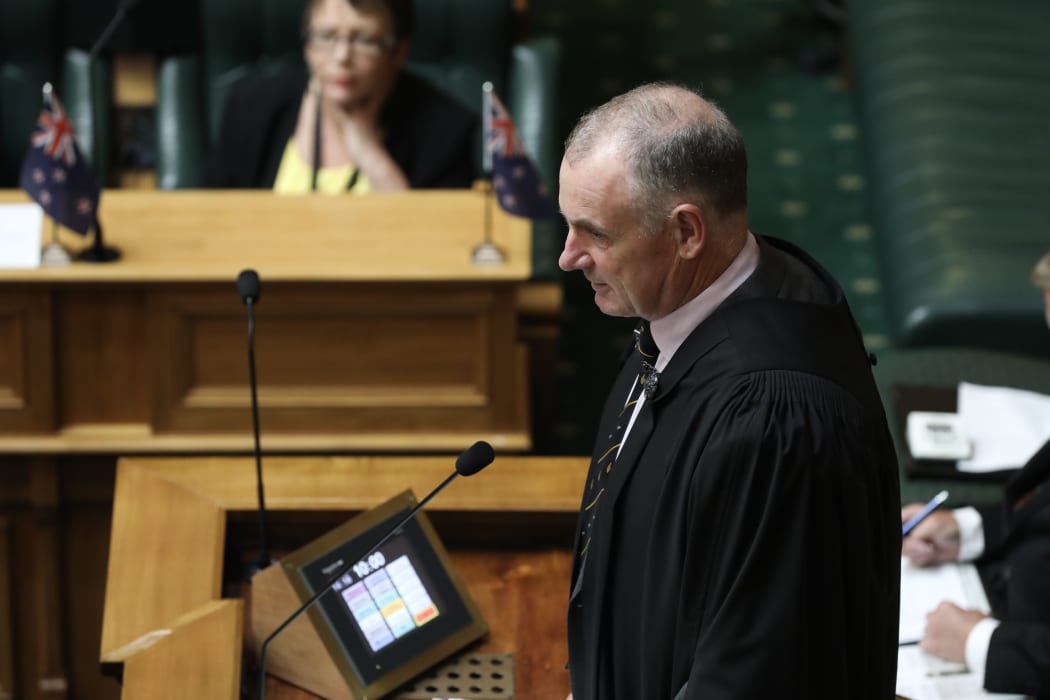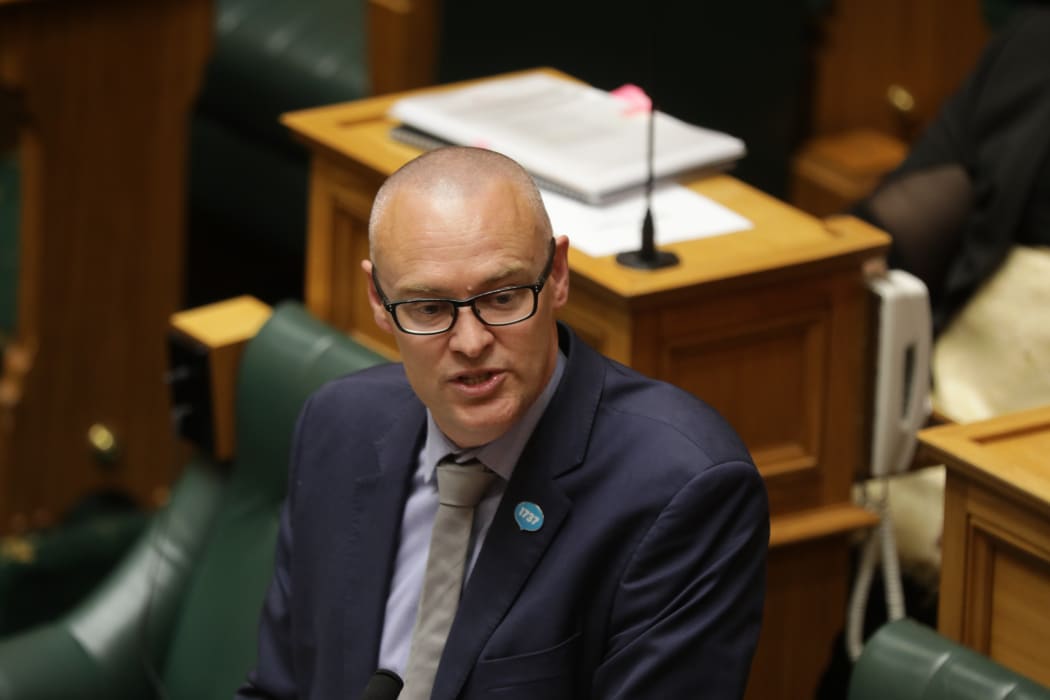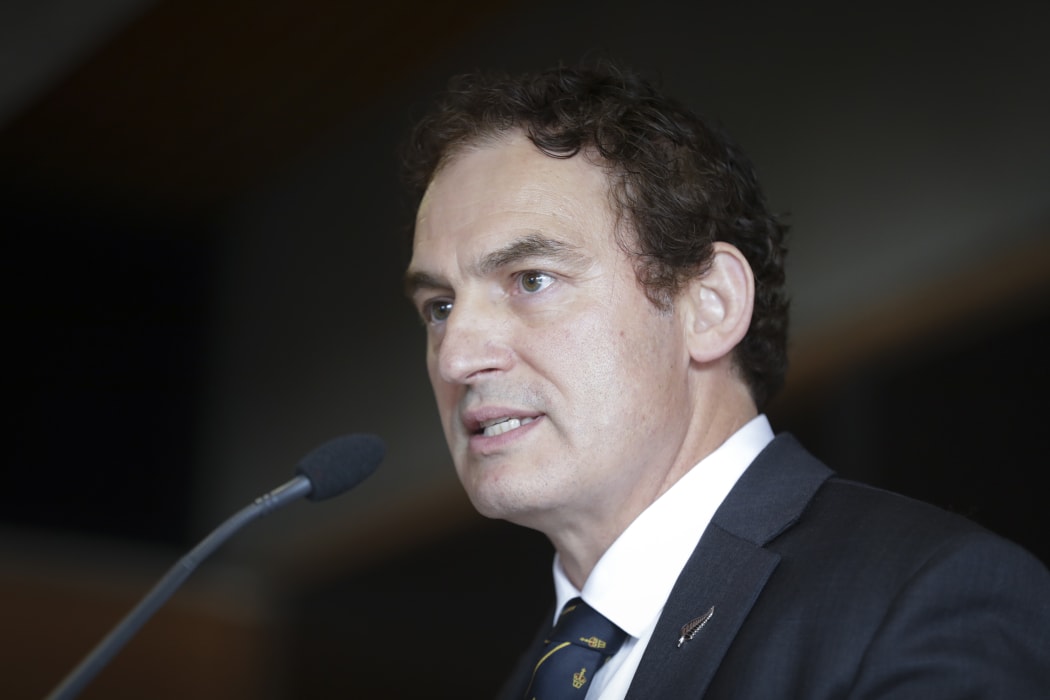Parliament is now settling into a rhythm of question time and debates a few weeks into the year.
Question time will take place each sitting day followed by debates on legislation, and the return of the General Debate on Wednesday. An outline of what the House of Representatives will try to work through today is below.
Question Time - 2pm
Twelve oral questions to Ministers which are published online before Midday. Questions must be lodged in the morning of a sitting day so the Clerk of the House and Speaker can check them over.
Opposition MPs will usually ask curly questions to expose a Government failing, while MPs from government parties will ask softer/patsy questions so Ministers can talk about their accomplishments.
The Speaker rules the show and any follow-up questions (called supplementaries) are at their discretion so best not anger the Speaker.

Much like a school classroom, when the Speaker Trevor Mallard is on his feet MPs are expected to sit quiet and listen to what he has to say. Photo: VNP / Phil Smith
Scrutinising Government spending - first reading but no debate
What:
-
The Appropriation (2017/18 Confirmation and Validation) Bill
-
Examining the Government’s spending for the last financial year and signing off on it. In technical language the bill “confirms the Public Finance (Transfers Between Outputs) Order 2018, which was made under section 26A of the Act (clause 5)”
-
The first reading will take place without a debate meaning this won’t take much time to deal with in the House.
Who:
-
The Minister of Finance Grant Robertson is in charge of this bill.

Minister of Finance Grant Robertson Photo: VNP / Phil Smith
Why:
-
This is part of Parliament’s financial cycle which overlaps and looks backwards while also looking forwards. Government plans to spend money (the Budget), are scrutinised at the same time as how the Government spent the money (annual reviews). The performance of government departments/agencies is also scrutinised as part of this cycle.
-
This bill in particular leads into the annual review process which is scrutiny of how well the Government did. Ministers and bosses of departments have been appearing in front of select committees to justify their performance and discuss their funding. Reports from committees are sent back to the House and debated over 13 hours at the committee stage of this bill; it’s called the Annual Review Debate.
Misuse of Drugs Amendment Bill - first reading
What:
-
It will re-classify the two main synthetic cannabinoids as Class A substances, specifically AMB-FUBINACA and 5F-ADB.
-
This gives Police and Customs greater search and seizure powers, increasing their ability to disrupt supply and minimise access to these drugs.
-
The Bill also specifies that the benefits of a health-centered or therapeutic approach be considered when testing if the public interest requirements have been met to prosecute for possession.
-
Allows for temporary drug class orders to be made by the Minister of Health so any new synthetic drugs can be dealt with quickly.
Who:
-
The Minister of Health David Clark.

Minister of Health David Clark. Photo: RNZ / Rebekah Parsons-King
Why:
-
To reduce drug related harm. Since June 2015 there have been 50-55 deaths provisionally linked to the use of two dangerous synthetic drugs, 5F-ADB, and AMB-FUBINACA.
-
The Bill says “addressing drug-related harm requires a health-based response, rather than a punitive one, so that people can access the health and social support services they need.”
Setting tax rates - third reading
What:
-
Official title: Taxation (Annual Rates for 2018/19, Modernising Tax Administration, and Remedial Matters) Bill
-
12 speeches of up to ten minutes in length.
-
This bill sets the income tax rate for the current year and makes some other changes to the tax system including: introducing a “short process ruling” to allow small businesses to apply for a binding ruling from the Inland Revenue Department on how a taxation law would apply; allow people over 65 years to join KiwiSaver, although employers would not be obliged to make contributions for them; and add new KiwiSaver employee contribution rates of 6% and 10% to the existing rates of 3%, 4%, and 8%.
Who:
-
Minister of Revenue Stuart Nash is the sponsor of this bill.

Minister of Revenue Stuart Nash Photo: RNZ / Rebekah Parsons-King
Why:
-
Income Tax is one of the ways the Government collects revenue to pay for things like health, transport, housing, and education.
-
It’s also a confidence motion, like the debate on the Prime Minister’s Statement. No Government can operate without money so if the House doesn’t approve this bill then the Government couldn’t afford to do what it wants.
Tidying up internal affairs - second reading continued
What:
-
This second reading debate has already started but wasn’t quite finished off so the last speaker, Labour MP Ginny Anderson, will get to complete their speech.
-
It’s an Omnibus Bill meaning it will make changes to more than one Act including replacing the definition of 'disability assist dog' in the Dog Control Act 1996 and updating the definition of income in the Rates Rebate Act 1973 to reflect changes arising from the Veterans’ Support Act 2014.
-
A bill that’s reached second reading has come back from being considered by a select committee which often recommends changes. The report from the Governance and Administration Committee with suggested amendments can be found here.
Who:
- This bill is in the name of Nanaia Mahuta who is Minister for Local Government.

Minister for Local Government Nanaia Mahuta Photo: RNZ / Cole Eastham-Farrelly
Voting Online - second reading
What:
-
More of the second reading of the Local Electoral Matters Bill.
-
It’s an Omnibus Bill meaning it will make changes to more than one Act. One of those changes is to “support the conduct of trials of novel voting methods” like online voting.
Who:
- Also in the name of the Minister of Local Government Nanaia Mahuta.
Tidying up ACC - committee stage
What:
-
Official title: The Accident Compensation Amendment Bill
-
This bill aims to tidy up inconsistencies between different pieces of legislation and keep the regulations up to date and relevant.
-
It will make several changes including allowing surviving spouses to receive up to five years of weekly compensation regardless of age, and disestablishing the Accident Compensation Appeal Authority, which hears cases under the 1972 and 1982 Accident Compensation legislation.
-
In committee stages bills are effectively pulled apart and examined to make sure they will do what they promise to do. This means the duration can vary from very quick to drawn out.
Who:
-
The Minister for ACC Iain Lees-Galloway

Minister for ACC Iain Lees-Galloway Photo: VNP / Phil Smith
Criminalising cartels - committee stage
What:
-
The Bill amends the Commerce Act to specifically criminalise cartel behaviour.
-
It also helpfully outlines what that is: “A cartel is an anticompetitive arrangement by competitors to do any of the following: fix, control, or maintain prices; establish output restrictions or quotas; share or divide markets by allocating customers, suppliers, territories, or lines of commerce."
Who:
- Minister for Commerce and Consumer Affairs, Kris Faafoi

Minister for Commerce and Consumer Affairs, Kris Faafoi Photo: RNZ / Cole Eastham-Farrelly
Why:
-
A review begun in 2010 suggested that there might not be appropriate disincentives for cartels in New Zealand, and that competition regulations might be out of step with international ones regarding cartels.
That's the plan. You can see what the House manages to get through each day on the Parliament website here.


